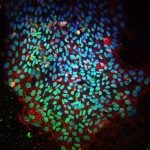Link to Pubmed [PMID] – 29424028
Link to HAL – pasteur-03278709
Link to DOI – 10.1002/gepi.22113
Genet Epidemiol 2018 Apr; 42(3): 250-264
The identification of gene-environment interactions in relation to risk of human diseases has been challenging. One difficulty has been that measurement error in the exposure can lead to massive reductions in the power of the test, as well as in bias toward the null in the interaction effect estimates. Leveraging previous work on linear discriminant analysis, we develop a new test of interaction between genetic variants and a continuous exposure that mitigates these detrimental impacts of exposure measurement error in ExG testing by reversing the role of exposure and the diseases status in the fitted model, thus transforming the analysis to standard linear regression. Through simulation studies, we show that the proposed approach is valid in the presence of classical exposure measurement error as well as when there is correlation between the exposure and the genetic variant. Simulations also demonstrated that the reverse test has greater power compared to logistic regression. Finally, we confirmed that our approach eliminates bias from exposure measurement error in estimation. Computing times are reduced by as much as fivefold in this new approach. For illustrative purposes, we applied the new approach to an ExGWAS study of interactions with alcohol and body mass index among 1,145 cases with invasive breast cancer and 1,142 controls from the Cancer Genetic Markers of Susceptibility study.




